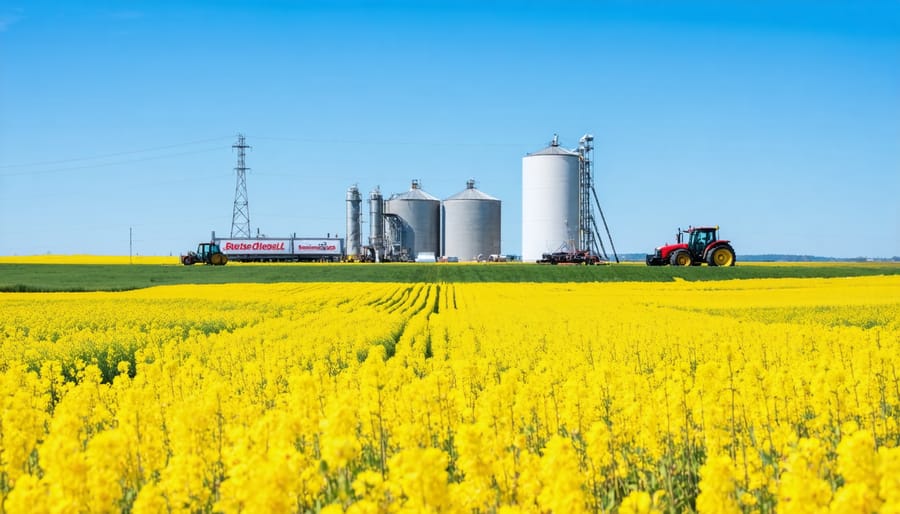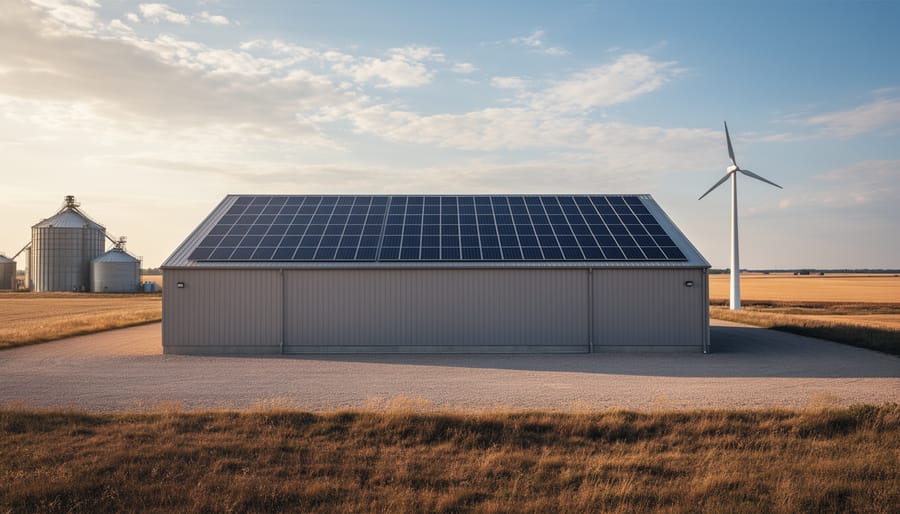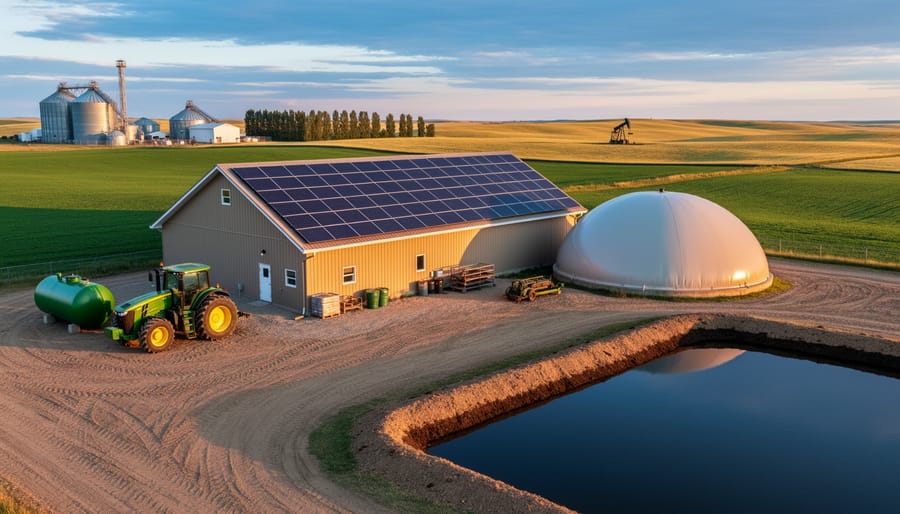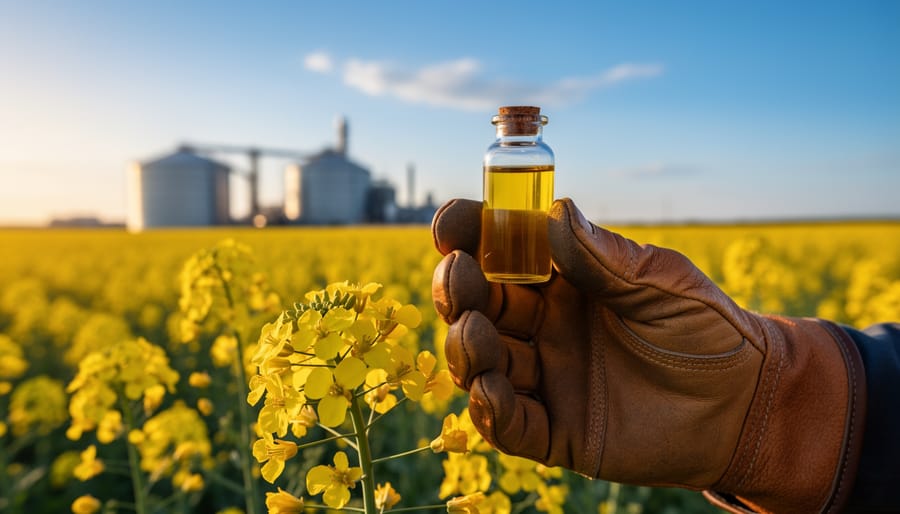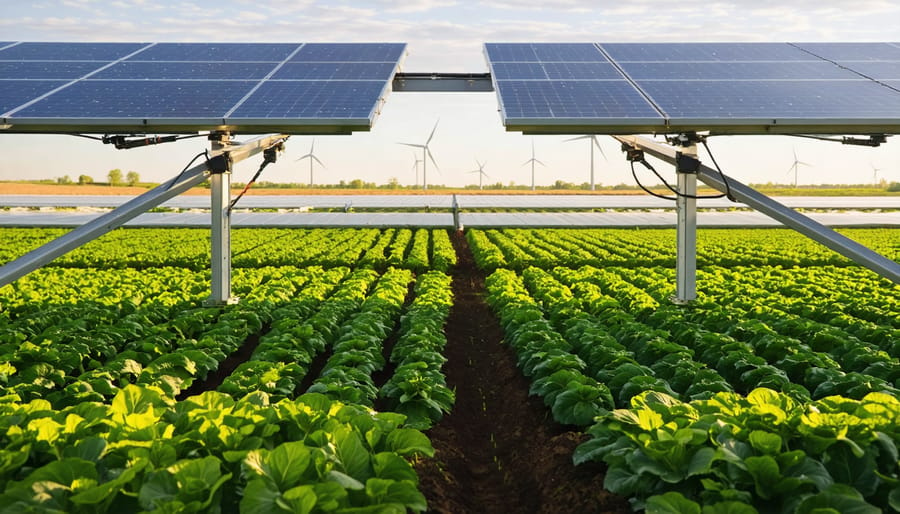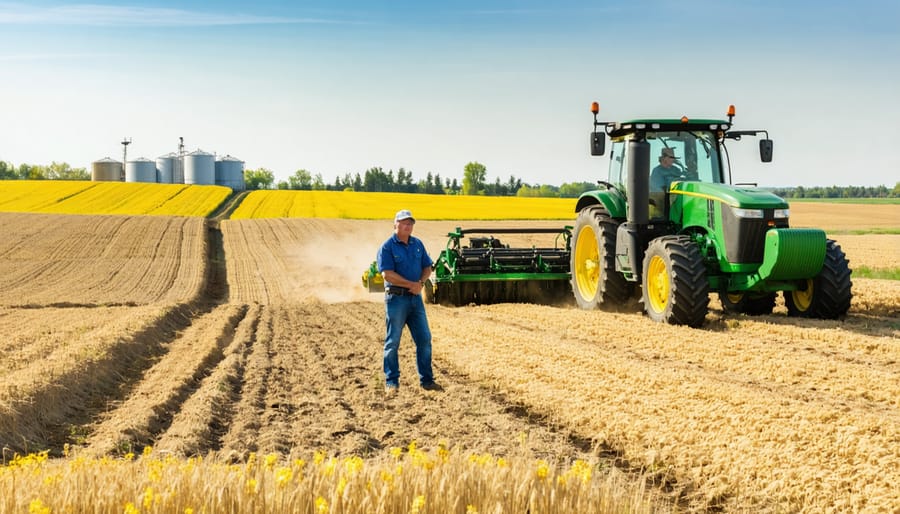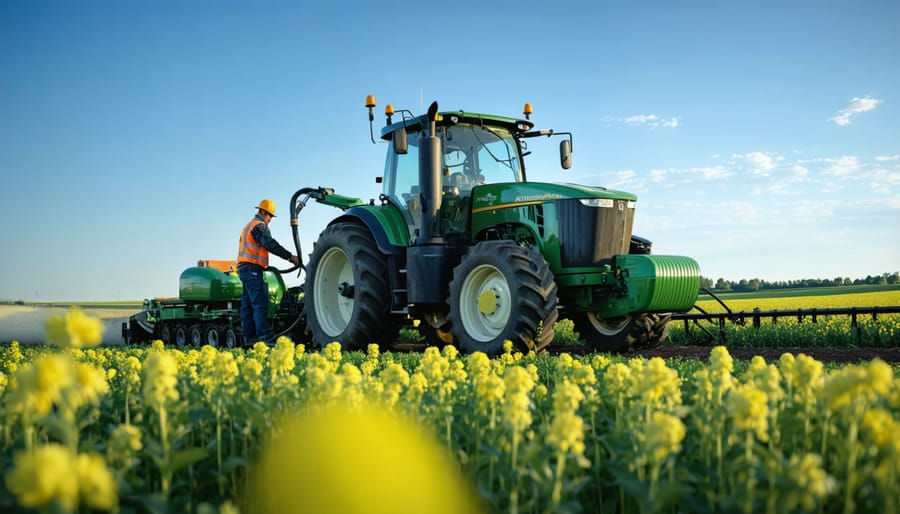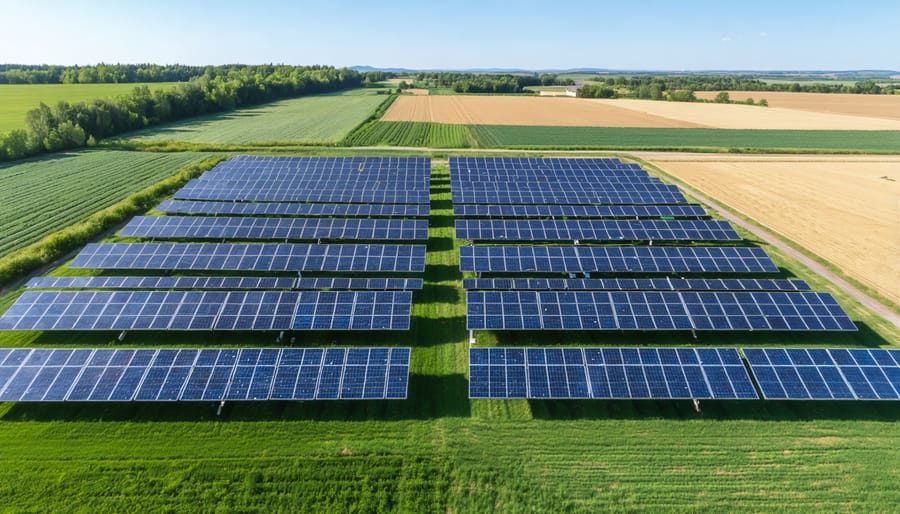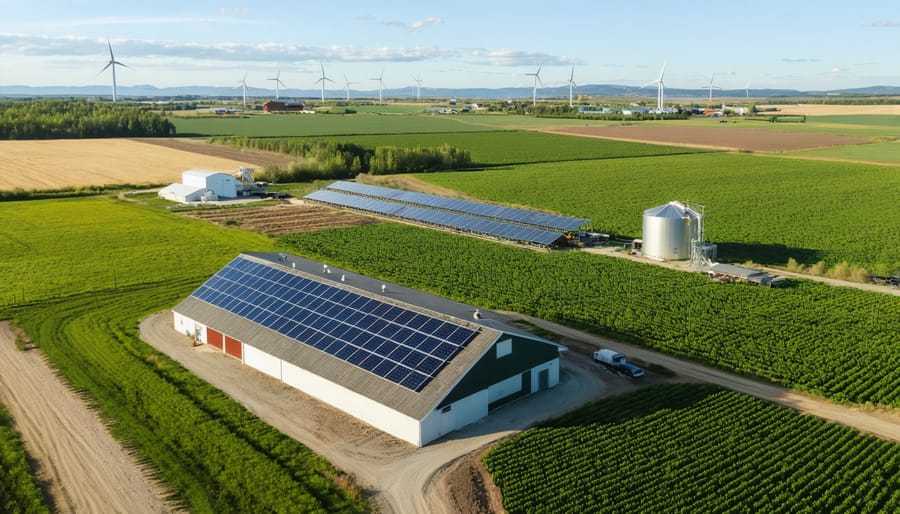From Rudolf Diesel’s groundbreaking 1893 invention of the compression-ignition engine running on peanut oil to today’s sophisticated biofuel industry, biodiesel stands as a testament to agricultural innovation and environmental stewardship. Canadian farmers pioneered biodiesel adoption in the 1990s, transforming waste vegetable oils and canola into a sustainable fuel alternative that now powers millions of vehicles across our prairie provinces.
When traditional diesel prices soared in the 1970s energy crisis, resourceful Alberta farmers began experimenting with vegetable oil-based fuels in their equipment. This practical necessity evolved into a full-fledged renewable energy revolution, with Canadian agricultural communities leading the charge in biodiesel research and implementation.
Today, biodiesel represents more than just an alternative fuel – it embodies the agricultural sector’s commitment to sustainability and innovation. Modern Canadian biodiesel production facilities process over 500 million litres annually, creating a renewable fuel that reduces greenhouse gas emissions by up to 80% compared to conventional diesel, while supporting local farming communities and strengthening our agricultural economy.
This remarkable journey from experimental fuel to mainstream energy source demonstrates how agricultural ingenuity continues to shape our sustainable future.
The Birth of Biodiesel: From Kitchen Waste to Farm Fuel
Rudolf Diesel’s Original Vision
When Rudolf Diesel first unveiled his groundbreaking engine at the 1900 World’s Fair in Paris, he demonstrated it running on peanut oil – not petroleum diesel as many might assume. This wasn’t a coincidence; Diesel specifically designed his engine to run on plant-based oils, envisioning a future where farmers could grow their own fuel.
As a forward-thinking inventor, Diesel believed that vegetable oil-powered engines would help agricultural communities become self-sufficient. In his 1912 speech, he famously declared that the use of vegetable oils for engine fuels might seem insignificant at that time, but such oils could become as important as petroleum products in the future.
Diesel’s original vision aligned perfectly with sustainable farming practices. He saw vegetable oils as a renewable resource that could be produced locally, giving farming communities energy independence while creating additional revenue streams. Although his untimely death in 1913 meant he couldn’t fully realize this vision, his innovative thinking laid the foundation for today’s biodiesel industry, which continues to benefit Canadian farmers through crop diversification and value-added opportunities.
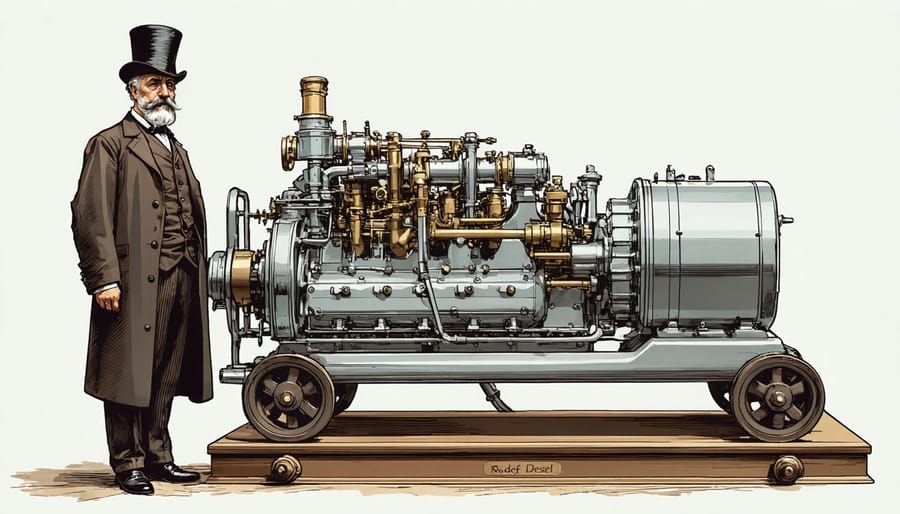
World War II and the Vegetable Oil Revolution
During World War II, fuel shortages forced nations to explore alternative energy sources, including vegetable-based fuels. As petroleum became scarce, farmers across North America, including those in the Canadian prairies, began experimenting with plant-based oils as fuel alternatives. This necessity sparked innovations in bioenergy from farm waste and vegetable oil processing.
The German military notably developed methods to convert rapeseed oil into fuel for their vehicles, while Allied forces explored similar technologies using locally available crops. In Canada, researchers at agricultural stations in Alberta and Saskatchewan began investigating how to process canola oil into usable fuel, laying the groundwork for modern biodiesel production.
These wartime developments proved that vegetable-based fuels could effectively power engines, though the technology wasn’t yet refined. The period’s innovations demonstrated the potential of farm-sourced fuel alternatives and established fundamental processes still relevant to today’s biodiesel production methods. This era of experimentation helped establish the practical foundation for contemporary agricultural biofuel initiatives across the Canadian prairies.
Modern Biodiesel Development in Canadian Agriculture
1990s Breakthrough: Canadian Canola Connection
The 1990s marked a transformative period for Canadian agriculture when farmers in the prairies, particularly in Alberta and Saskatchewan, pioneered the development of canola-based biodiesel. This breakthrough emerged from a combination of agricultural innovation and environmental consciousness, as farmers sought sustainable alternatives to traditional diesel fuel.
In 1993, a group of forward-thinking farmers in Westlock, Alberta, established the first commercial-scale canola biodiesel production facility in Canada. The initiative demonstrated that agricultural waste products and lower-grade canola could be effectively converted into high-quality biodiesel, creating a valuable secondary market for Canadian farmers.
The success of these early adopters sparked interest across the prairies. By 1996, several farmer cooperatives had formed to explore biodiesel production, leading to the establishment of processing facilities in various rural communities. These grassroots efforts were supported by research at the University of Saskatchewan, where scientists developed more efficient methods for converting canola oil into biodiesel.
The Canadian canola connection proved particularly significant because the crop was already well-established in the region, with existing infrastructure for cultivation and processing. This advantage meant farmers could transition into biodiesel production without major upheaval to their operations. Additionally, canola-based biodiesel performed exceptionally well in cold weather conditions, making it ideally suited for the Canadian climate.
By the end of the decade, Canadian farmers had not only pioneered a new market for their crops but had also established themselves as global leaders in agricultural-based renewable fuels.
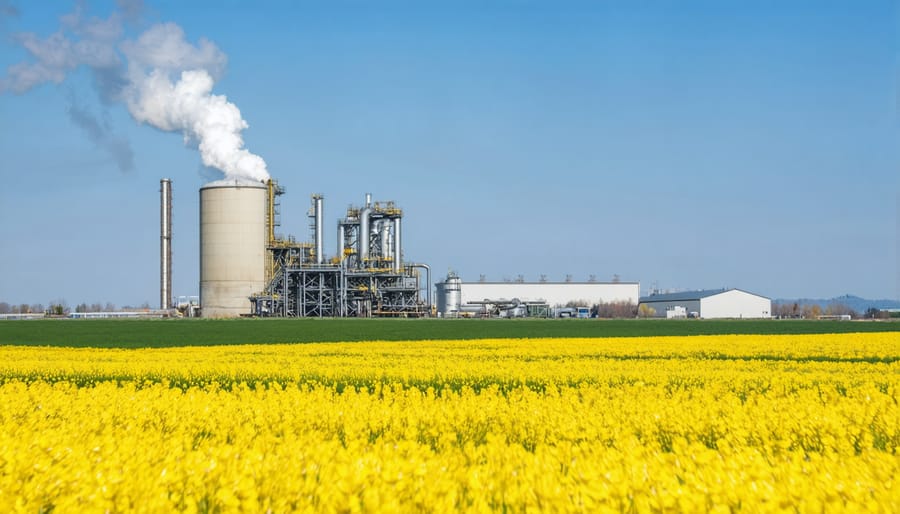
Alberta’s Agricultural Innovation Hub
Alberta has emerged as a leading force in biodiesel innovation, transforming the province’s agricultural landscape since the early 2000s. The establishment of the Biodiesel Research Centre at the University of Alberta in 2003 marked a pivotal moment, bringing together farmers, researchers, and industry experts to advance renewable fuel technology.
Local farmers have played a crucial role in developing sustainable agricultural practices that support biodiesel production. The Canola Council of Alberta’s initiative in 2005 helped establish a network of small-scale biodiesel processors across rural communities, enabling farmers to convert their crop waste into valuable fuel.
The Western Canada Biodiesel Association, founded in 2007, has been instrumental in connecting agricultural producers with research facilities. Their work has led to breakthrough innovations in cold-weather biodiesel performance, addressing one of the primary challenges faced by Canadian farmers.
Notable achievements include the development of specialized canola varieties optimized for biodiesel production and the implementation of community-based processing facilities that serve multiple farms. These facilities now process over 100 million litres of biodiesel annually, creating new revenue streams for local agricultural operations while reducing carbon emissions.
Recent collaborations between Alberta’s agricultural cooperatives and technical institutions have focused on improving conversion efficiency and reducing production costs, making biodiesel an increasingly viable option for farm operations of all sizes.
Farm-to-Fuel Success Stories
The Stettler family farm’s journey to biodiesel success began in 2015 when they converted their fleet of tractors to run on locally-produced biodiesel. Within two years, they reduced their fuel costs by 35% while maintaining optimal equipment performance. Their success inspired neighboring farms to explore similar innovative farming solutions.
In Lethbridge County, the Morrison Agricultural Cooperative established a community-based biodiesel production facility in 2018. Using canola waste from their members’ farms, they now produce 500,000 litres of biodiesel annually, supplying fuel to 12 local farms while creating additional revenue streams for their members.
The Red Deer Valley Farm collective demonstrates how small-scale operations can benefit from biodiesel integration. Their 2020 initiative to convert waste cooking oil from local restaurants into biodiesel not only reduced fuel expenses by 40% but also strengthened community ties. They now process 200,000 litres of waste oil annually, preventing it from entering landfills.
Perhaps most notably, the Peace River district’s collaborative approach shows how multiple farms can work together. Their shared biodiesel processing facility, established in 2019, serves 25 farms across the region. This cooperation has led to reduced equipment costs, shared expertise, and a sustainable fuel supply that’s weather-resistant and locally controlled.
These success stories highlight how Alberta farmers are leading the way in sustainable fuel innovation, proving that biodiesel isn’t just environmentally conscious – it’s economically smart.
Environmental Impact Through the Years
Carbon Footprint Reduction
Historical data shows that Canadian farmers who adopted biodiesel in their agricultural operations have achieved significant reductions in their carbon footprint. Starting in the early 2000s, Alberta farms reported an average 20% decrease in greenhouse gas emissions when switching from conventional diesel to B20 blends in their equipment.
A landmark 2005 study conducted by the University of Saskatchewan demonstrated that farms using biodiesel reduced their CO2 emissions by approximately 3.2 tonnes per year for each piece of heavy machinery converted. This reduction became even more pronounced as farming operations expanded their biodiesel usage throughout the 2010s.
In the Lethbridge region, a group of canola farmers documented their transition to biodiesel between 2008 and 2018, showing cumulative emissions reductions of nearly 15,000 tonnes across 50 participating farms. What made this achievement particularly noteworthy was that these farms were also producing their own feedstock for biodiesel production, creating a sustainable closed-loop system.
Recent data from Agriculture and Agri-Food Canada indicates that farms using biodiesel blends of B20 or higher have reduced their equipment-related carbon emissions by up to 25% compared to conventional diesel operations. This improvement, combined with biodiesel’s biodegradability and lower toxicity, has made it an increasingly attractive option for environmentally conscious farmers across the prairies.

Waste Management Evolution
The evolution of biodiesel production has transformed agricultural waste management across Canadian farms, particularly in regions like Alberta where canola farming is prevalent. In the early 1990s, farmers often struggled with disposing of used cooking oil and animal fats, which typically ended up in landfills or became costly disposal challenges.
By the mid-1990s, innovative farmers began experimenting with converting these waste products into biodiesel, creating a sustainable solution for their waste management needs. This shift not only reduced disposal costs but also created a valuable secondary income stream for many agricultural operations.
Local success stories include the Thompson family farm in Red Deer, which in 1998 became one of the first operations to implement a small-scale biodiesel production system. Their initiative helped manage nearly 5,000 litres of waste oil annually while producing fuel for their farm equipment.
The waste-to-fuel movement gained significant momentum in the early 2000s when several community-based biodiesel cooperatives emerged across Alberta. These cooperatives collected waste oil from multiple farms and restaurants, processing it into usable fuel while reducing the environmental impact of improper disposal.
Today, modern biodiesel facilities can process various agricultural waste products, including spoiled grain, animal fats, and crop residues. This advancement has helped Canadian farmers reduce their environmental footprint while turning what was once a disposal expense into a profitable venture.
Future Outlook: What’s Next for Farm Biodiesel
The future of farm biodiesel in Canada looks increasingly promising, with several emerging trends shaping its trajectory. Industry experts project that by 2030, biodiesel production from agricultural waste could triple, offering Canadian farmers new revenue streams while supporting environmental sustainability.
Recent innovations in processing technology are making small-scale biodiesel production more efficient and cost-effective for individual farms. These advances, combined with growing support for renewable energy integration, are creating opportunities for farmers to become energy independent while reducing their carbon footprint.
In Alberta, pilot projects are demonstrating the viability of community-based biodiesel cooperatives, where groups of farmers share resources and equipment to produce fuel for their collective use. This model is expected to become more widespread across the Prairie provinces in the coming years.
Research at Canadian agricultural institutions is focusing on developing cold-weather-resistant biodiesel blends, addressing one of the main challenges for year-round use in our climate. Scientists are also exploring new feedstock options, including agricultural residues and purpose-grown energy crops that can thrive in marginal lands.
Government incentives for sustainable agriculture are expected to increase, with several provinces considering enhanced support for on-farm biodiesel production. These initiatives may include grants for equipment upgrades and tax credits for biodiesel production.
The integration of smart technology and automation in biodiesel production systems is another emerging trend. Modern systems can monitor quality parameters in real-time and adjust processing conditions automatically, making it easier for farmers to maintain consistent fuel quality.
For Canadian farmers considering biodiesel production, the next five years present an ideal window of opportunity. With improving technology, growing market demand, and increasing environmental awareness, farm-based biodiesel is positioned to become a key component of Canada’s agricultural future.
Throughout its remarkable journey, biodiesel has evolved from a scientific curiosity to a viable alternative fuel source that’s making a significant impact in Canadian agriculture. From Rudolf Diesel’s early experiments with peanut oil to today’s sophisticated production methods, the industry has consistently demonstrated its ability to adapt and innovate.
For Alberta farmers, this history represents more than just technological progress – it’s a story of agricultural diversification and environmental stewardship. The development of more efficient processing methods, improved cold-weather performance, and the establishment of local production facilities has made biodiesel an increasingly practical choice for our farming communities.
Looking ahead, the future of biodiesel in Canadian agriculture appears promising. With growing environmental awareness and the push for sustainable farming practices, biodiesel continues to gain traction among producers across the prairies. The industry’s evolution has created opportunities for farmers to participate in both fuel production and consumption, contributing to a more sustainable agricultural sector.
As we move forward, it’s crucial to remember that each farmer who adopts biodiesel technology builds upon this rich history and helps shape its future. By embracing biodiesel as part of our agricultural practices, we’re not just following a trend – we’re participating in a longstanding tradition of innovation and environmental responsibility that benefits our farms, our communities, and our planet.
Consider exploring biodiesel options for your operation and connecting with local producers to learn more about implementation strategies that work best for our unique Canadian farming conditions.

